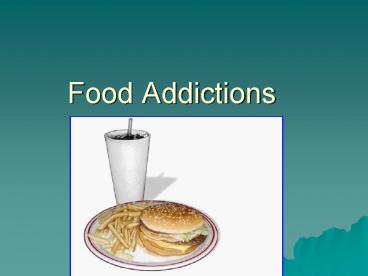Food Addictions - PowerPoint PPT Presentation
1 / 15
Title:
Food Addictions
Description:
Anorexia bulimia compulsive overeating. Characteristics of those at risk of ... Bulimia Nervosa. Binge-purge cycle to prevent weight gain ... Bulimia cont'd ... – PowerPoint PPT presentation
Number of Views:412
Avg rating:3.0/5.0
Title: Food Addictions
1
Food Addictions
2
- Characterized by preoccupation with food, the
availability of food and the anticipation of a
mood from eating - Either exhibit a complete loss of control when
faced with food or fear of losing control and
thus avoiding food - Anorexia ?? bulimia ?? compulsive overeating
3
Characteristics of those at risk ofdeveloping
food-related problems
- Often grow up as perfectionists
- 1st born ? set example ? high expectations
- 2) Mother has history of dieting
- Focus on weight and appearance
- 3) Father is emotionally distant
- Desire for recognition ? deep desire to please
well into adulthood
4
- 4) Often mother is codependent
- Strong need to care for others while neglecting
self - 5) Home with very strict discipline
- Punishment severe and often physical
- 6) Parents use guilt/shame as discipline
- Deep emotional insults ? feelings of incompetence
- 7) Sexuality not discussed at home or treated as
something dirty - Shame at puberty
5
- 8) Father uses daughters to complain about mother
- Sets up pattern of not openly expressing emotions
(-ive or ive) - 9) From home where children forced to be adults
- Role of substitute mother ? immaturity not
acceptable - 10) Sexually abused
- Shame/guilt/loss of control
6
- 11) Have desire to OVERPLEASE
- Compliant submissive
- 12) Tendency to deny anger in self others
- Inability to express/confront emotions ? poor
communication/coping skills - 13) Overuse food for pleasure or reward
- Food main source of comfort
- Athletes/Dancers at increased risk
7
Types of food addictions
- Anorexia Nervosa
- Intense fear of gaining weight
- Early teens ? start of puberty
- Changes in body loss of control ? uses food to
regain control - Avoids food and/or engages in ritualistic
behaviour - Excessive weighing measuring of body
8
Anorexia contd
- Emotional high experienced when weight is loss
or food is refused - Often avoids food events ? holidays esp.
problematic - Often perfectionist personality ? considers self
fat ? can never be too thin - Self-esteem dependent on being thinnest, neatest,
smartest, etc.
9
Anorexia contd
- May dress in layers to hide body or dress to
flaunt thinness as badge of achievement - Unlikely to abuse other addictive substances
- High achievers and compulsive in other areas
(academics, sports, cleanliness, etc)
10
Anorexia contd
- Early stages ? may have elevated levels of
endorphins ? report elevated mood or mood swings - Later stages ? lower levels of serotonin
- Problems include ?disruption of menstrual cycle,
thinning of hair, abnormal growth of lanugo,
yellowish palms/soles, dry, pasty skin, dizziness
headaches, intolerance to cold, impaired
concentration, muscle weakness, social
withdrawal, depression, irritability
11
Treatment includes
- Psychological counselling to correct irrational
thinking - Nutritional and medical care
- Antidepressants may be useful
12
Bulimia Nervosa
- Binge-purge cycle to prevent weight gain
- Develops after puberty (generally)
- More likely to maintain normal or slightly high
body weight - Eat fast
- Binges often planned, organized
- 90 induce vomiting ? others may misuse
laxatives, diuretics excessive exercise - 45 abuse alcohol or drugs
- More likely than anorexics to realize problem and
seek help
13
Bulimia contd
- Problems include loss of dental enamel/tooth
decay, swollen saliva glands, sore throat,
irregular menstrual cycle, dependency on
laxatives, electrolyte disturbances, risk of
heart attack, mood swings, depression, irregular
heartbeats - Treatment includes nutritional/medical
counselling, psychological counselling,
antidepressants
14
Compulsive overeaters
- Inappropriate use of food and loss of control
over how much eaten - Diet consists of carbohydrates and junk food
- Most eating done in secret, almost continuous
activity - Usually begins in early childhood
(reward/substitute for love) - Many victims of sexual abuse (fat emotional
armour) - Boys may use excessive weight to cover lack of
physical skill
15
- Problems include obesity, diabetes,
hypertension, heart disease, digestive problems,
arthritis, respiratory disorders, social
withdrawal, social professional problems
attributed to weight - Treatment ? difficult as abstinence not viable
option and not yet taken seriously as a
psychological disorder ? viewed with disgust - Most common prescribed diet appetite
suppressants may help































